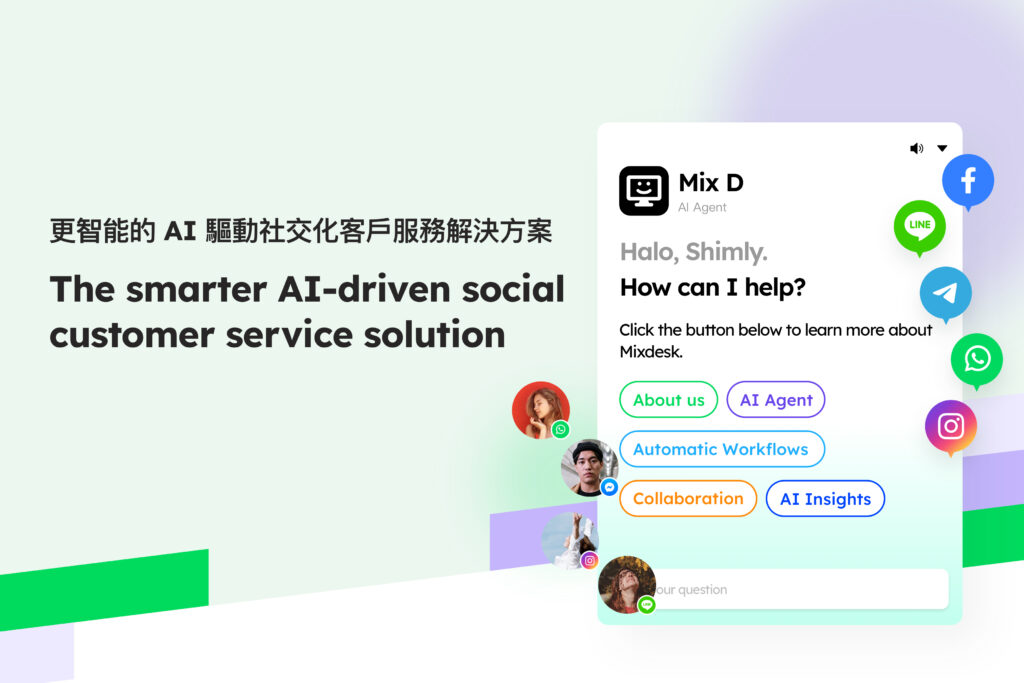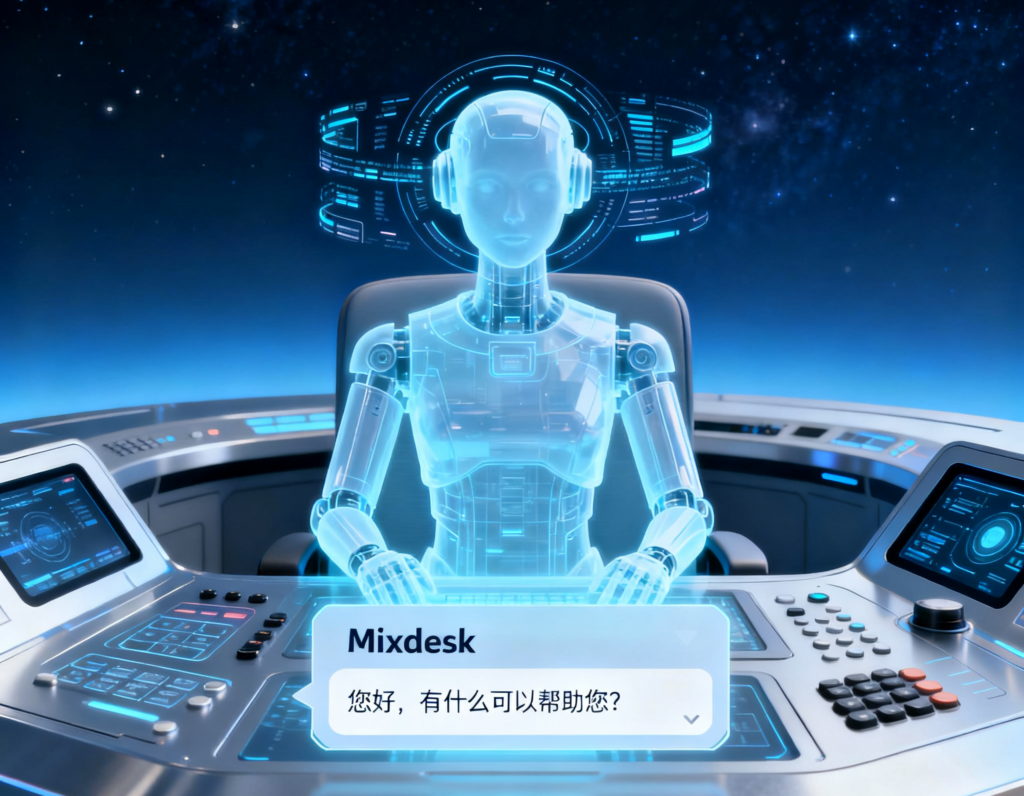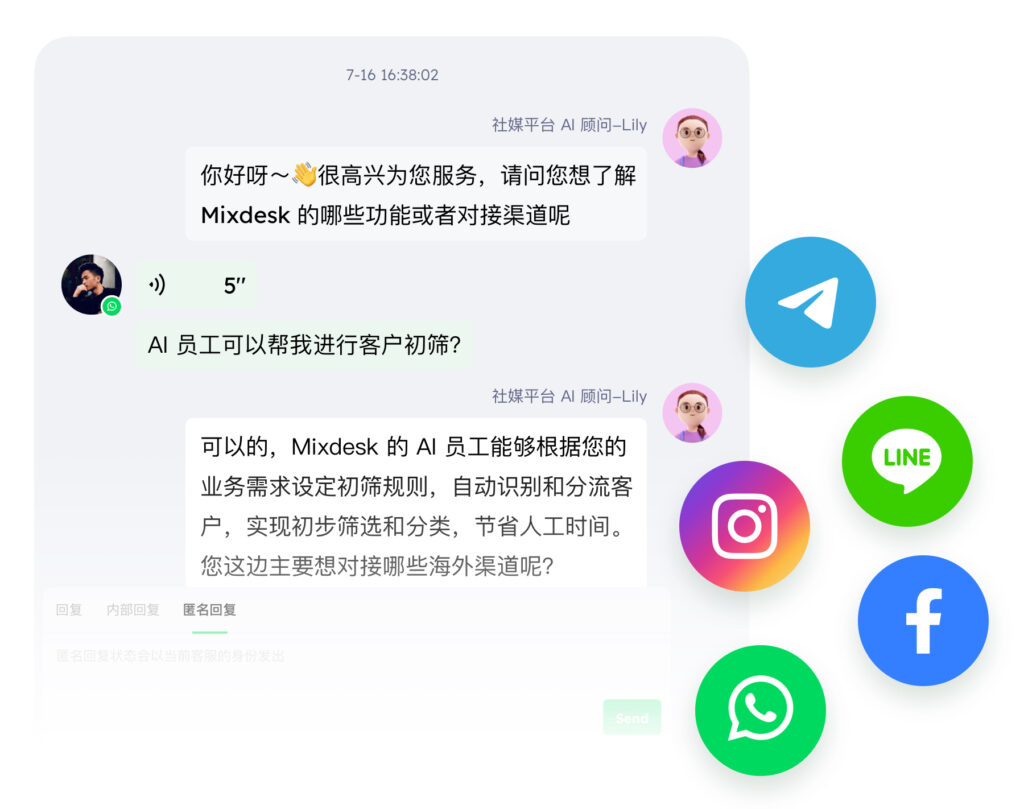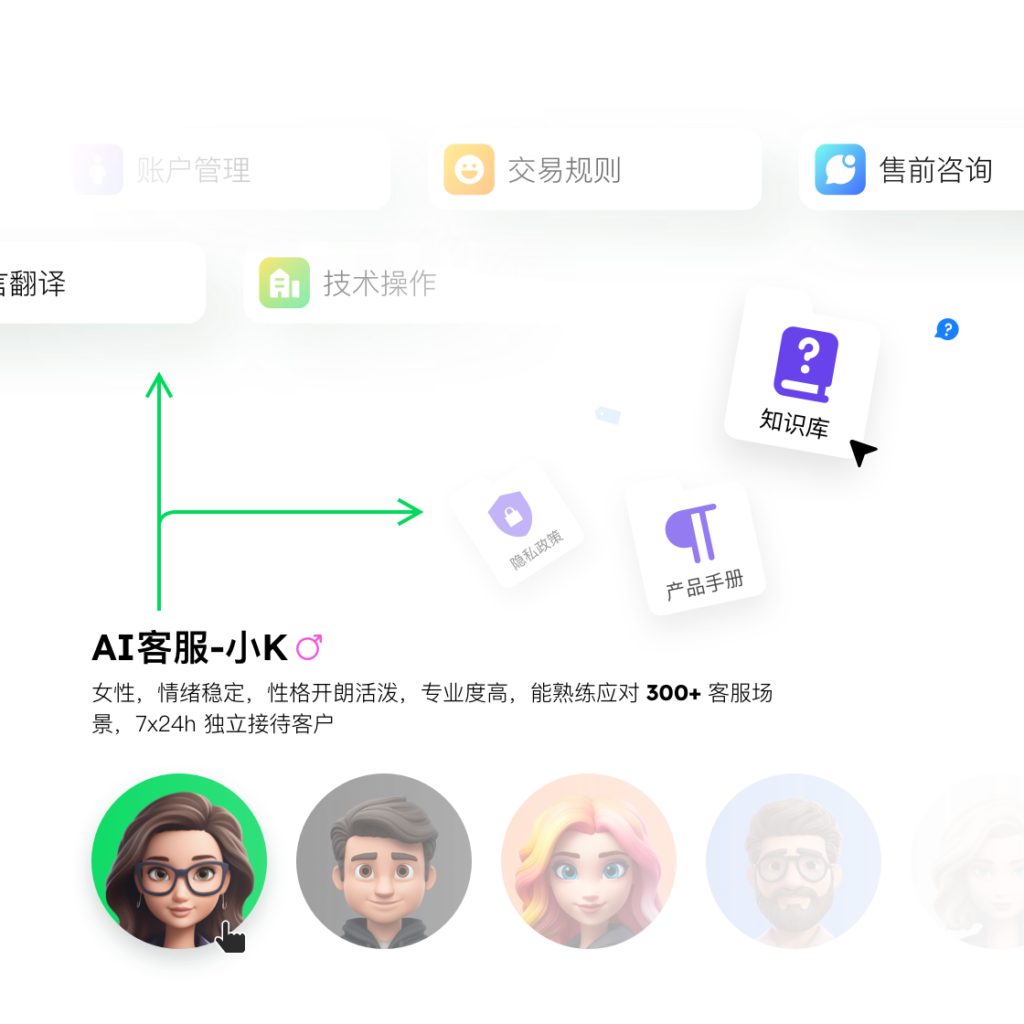Author of this article:Fiona
Introduction: AI Agent changes the future of the customer service industry
Global AI Agent Market size in 2025Has reached US 77.38 billion, A double increase from US 33.7 billion in 2023, and it is expected that this figure will increase by 2032.Exceeded 100 billion U.S. dollarsThe compound annual growth rate is as high as 45.3%. Behind this explosive growth is the key turning point of AI Agent from laboratory to industrial application-from a simple dialogue and interaction tool to an agent with autonomous decision-making, environmental perception, and tool use capabilities.
The rapid development of AI technology has penetrated into all walks of life, especially in the field of customer service.,AI Agent It is becoming a core component of the daily operations of enterprises. From the original simple rule system to the integration of large language models (such as GPT, DeepSeek, etc.)Smart assistant, AI Agent is already changing the way of customer service, improving efficiency, and reducing operating costs.
This article will delve into the current situation of AI Agent, analyze its application in the customer service industry, and explore future development trends.
Mixdesk
AI Agent

- Introduction: AI Agent changes the future of the customer service industry
- 1. The definition and evolution of AI Agent
- 2. The transition of core capabilities: from passive response to active decision-making
- 3. Application areas and impact of AI Agent
- Fourth, the technological development trend of AI Agent
- 5. Future trends and Corporate Preparations: Grasp the next wave of AI Agents
1. The definition and evolution of AI Agent
- Definition of AI Agent
AI Agent(Artificial intelligence agent) is an automated service tool based on artificial intelligence technology that can simulate conversations with humans and provide intelligent support. AI agents usually use machine learning (ML), natural language processing (NLP), deep learning (DL) and other technologies to analyze and respond to customer requests. Compared with the traditional automatic response system, AI Agent has higher flexibility and intelligence, and can perform complex interactions, emotional understanding, and dynamic adjustments.
- From simple automation to intelligence
The earliest AI systems mainly relied on rule foundations and preset processes, such as the early IVR (Interactive Voice Response) system and FAQs (frequently asked questions). These systems perform well in simple scenarios, but cannot handle complex and dynamic customer requests. With the breakthroughs in NLP and deep learning technology, AI agents have begun to possess the ability to understand context, emotions, and dialogue.

- Development history
- Early days: Rule-based system —These systems interact based on a preset rule base and cannot adapt to complex situations.
- Mid-term: Natural language processing (NLP) -NLP technology enables AI to understand and generate natural language, improving the quality of interaction.
- Modernity: the Application of the Big Language Model —Such as ChatGPT and DeepSeek, combining big data with advanced learning algorithms,AI Agent Be able to talk to customers more naturally and providePersonalized service。
2. The transition of core capabilities: from passive response to active decision-making
The AI Agent in 2025 has been realizedThree key capabilitiesThe breakthrough has made it evolve from an auxiliary tool to an intelligent collaboration partner with the ability to act autonomously. These capabilities have produced significant efficiency gains in enterprise-level applications.

- Multi-modal interaction abilityEliminates obstacles to human-computer communication. Modern AI agents can process multiple input methods such as text, voice, and images at the same time.Customer serviceThe performance is particularly prominent in the scene. Use of a cross-border e-commerce platform Mixdesk After the AI agent, the recognition accuracy rate of voice consultation reached 96%, and the automatic resolution rate of image problems (such as product defect photo consultation) and customer waiting time have been significantly improved. The ability of AI Agent to quickly adjust adapted communication methods is particularly suitable for the international market.
- Autonomous learning and evolutionary mechanismEnable AI Agent to continuously optimize performance. Through reinforcement learning and learning from environmental feedback, the agent can continuously adjust the decision-making model. When the dispatching AI agent of a logistics enterprise was initially deployed, the route planning accuracy rate was 78%. After 3 months of actual operation data learning, the accuracy rate increased to 94%, and the transportation cost was reduced by 18%. This evolutionary ability comes from the ”experience bank" technology-AI Agent will record success stories and failure lessons to form a reusable decision-making template.
- Cross-system collaboration abilityBroke the enterprise data silos. Some advanced AI agents have been able to seamlessly integrate CRM, ERP, logistics systems and payment platforms to achieve true end-to-end process automation. Taking the customer's query order as an example, with the help of Mixdesk With the AI agent, the system can call the linked enterprise ERP to generate an accurate response instantly without manual intervention. This not only significantly improves the customer experience, but also reduces the time and cost consumption caused by manual operations.
3. Application areas and impact of AI Agent
The application of AI Agent in the customer service industry is constantly expanding, covering customer service, sales transformation and even technical support, helping enterprises to improve efficiency and customer satisfaction in an all-round way.
- Customer service: improve response efficiency and satisfaction
The application of AI Agent in the customer service industry has gradually become popular. They canQuick responseCustomer inquiries, automatically handle common problems, and work around the clock to ensure that customers can get support at any time.
- Automation Frequently Asked Questions: AI Agent can identify and answer a large number of standardized questions, such as “order status”, “refund policy”, etc., reducing the burden on manual customer service.
- 24/7 customer support: AI Agent is not limited by time and can provide customers around the world withAll-weatherservice.
- Sentiment analysis: Combining NLP and sentiment analysis technology, AI Agent can adjust the tone and content of the reply according to the customer's emotions to improve customer satisfaction.
- Sales and active marketing: customer guidance and personalized recommendations
In the field of marketing and sales, AI Agent can not only improve response speed, but also improve customer conversion rate. Enterprises can customize rules for high-frequency business scenarios, combine basic quick reply/quick buttons with AI capabilities, and build a whole processautomationResponse logic. Truly realize the efficient model of "automatically undertaking basic needs and manually focusing on complex services".
- Guide customers: When Mixdesk When the AI agent recognizes that the customer has a clear purchase intention, it will automatically transfer the conversation to the artificial customer service to ensure that every potential business opportunity will not be lost.
- Personalized recommendation: Mixdesk It can automatically label customers accurately, which is convenient for enterprises to carry out hierarchical management in the future, and target mass content at the right time to achieve more efficient marketing conversion.
- Enterprise operation: reduce labor costs and optimize processes
The introduction of AI agent has greatly reduced the number of manual customer service and reducedLabor cost。 At the same time, they can work continuously and collect data continuously to help companies optimize service processes.
- Automated process: AI agents can handle simple and repetitive tasks, allowing human employees to focus on more challenging tasks.
- Data collection and analysis: AI Agent can analyze key data of the dialogue in real time to help companies identify potential problems and directions for improvement.

Mixdesk is an overseas multi-channel intelligent customer communication platform that can unify multiple channels such as Facebook, Instagram, WhatsApp, Line, Telegram, and Email to help companies communicate and serve customers. Mixdesk also supports AI employee functions, allowing enterprises to achieve more efficient automated customer service.
Fourth, the technological development trend of AI Agent
Development trend
With the continuous progress of AI technology, the functions of AI Agent are also constantly expanding and optimizing. The following are some important technological trends:

- Smarter natural language understanding
With the development of deep learning and big data analysis, AI agents will be able to better understand and generate natural language, simulating the fluency and diversity of human dialogue. For example, in the future, AI agents will be able to understand implied emotional information, such as the customer's tone, emotions, etc., so as to give a more personalized response.
- Deep learning and self-optimization ability
AI agent can not only rely on manual programming rules to operate, but also optimize itself through deep learning technology. With the increase in interaction with customers, AI agents will be able to continuously improve their ability to deal with complex problems through self-learning.
Challenges and bottlenecks
Despite the rapid development, AI Agent still faces multiple challenges. The industry discussion in 2025 has shifted from “technical possibility” to “practical feasibility”, focusing on how to solve the real obstacles in the implementation.
- Limitations of complex task processing
AI agents still have great limitations when dealing with complex tasks or scenarios that require a high degree of creativity and judgment. For example, when dealing with certain technical support issues, AI agent may not be able to give accurate solutions, and still need to rely on manual customer service.
- The problem of personalized service
Although AI Agent can perform some basic personalized services based on the historical behavior of customers, it is still a challenge to truly achieve an in-depth personalized experience. For example, to understand the deep needs and emotions of customers and provide comprehensive customized services still need to break through the limitations of existing technologies.
- Ethical privacy and compliance risks are increasingly prominent
As AI agents process more sensitive data, data security has become a key issue. The EU's special requirements for AI Agents under the EU's General RegulationsTermsIn it, it is required to clarify the scope of data use and the transparency of decision-making.
5. Future trends and Corporate Preparations: Grasp the next wave of AI Agents
Industry forecastIt shows that AI Agent will become the digital infrastructure of enterprises in the next 5-7 years. 2025 is the key window period for the layout of this technology, and enterprises need to prepare at the strategic level. The development of AI agent is standing at a key node from “usable” to “easy to use”, and the business practices of many brands have proven its transformative potential. For enterprises, this is not only an upgrade of efficiency tools, but also an opportunity for business model reconstruction. By choosing Mixdesk With such mature solutions, companies can quickly release the value of AI agent under the premise of controlling risks.
In the future, we can look forward to more mature and intelligent solutions that will play a greater role in various industries. If you want to apply an efficient and compliant AI customer service system in your enterprise, you may wish to consider Mixdesk, for yourCustomer serviceBring revolutionary improvements.

Mixdesk is an overseas multi-channel intelligent customer communication platform that can unify multiple channels such as Facebook, Instagram, WhatsApp, Line, Telegram, and Email to help companies communicate and serve customers. Mixdesk also supports AI employee functions, allowing enterprises to achieve more efficient automated customer service.
